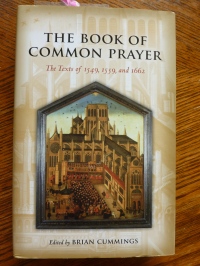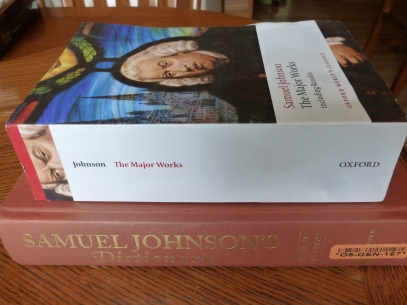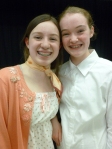“Blessed is the man that hath not walked in the counsel of the ungodly, nor stood in the way of sinners: and hath not sat in the seat of the scornful. But his delight is in the law of the Lord… And he shall be like a tree planted by the water-side: that will bring forth his fruit in due season. …As for the ungodly it is not so with them: but they are like the chaff which the wind scattereth away from the face of the earth.” ~Psalm 1:1-3, 5 (1540)
It has been almost 3 weeks since I started reading through the book of Psalms, and I’m now 2/3 of the way through. The goal was, of course, to have daily morning and evening devotions that followed the 1662 Book of Common Prayer’s Psalter readings to get a feel for what 18th century British people would have been singing through every day. The Psalms are the timeless collection of ancient Israel’s prayers, praises, worship songs, laments, etc.–the whole range of human emotions and life experiences in poetic form. The first two weeks of study actually went quite well and I kept up the schedule valiantly. Naturally things did rather fall apart half way through. For one thing, I was out of town for a conference for a couple of days; for another, my daughter started dating for the first time; also, in spite of good circumstances, I’ve been experiencing what Jane would call “low spirits” this week. But I did get caught up with the reading and note-taking and life goes on.
The note-taking is something I have to keep in check or it takes over. Since I am a detail-oriented person (possibly a little OCD), when I use underlining in my Bible reading I have a tendency to want to underline everything, because all of it is important or interesting in some way after all. Some time ago I switched to taking notes instead so the Bible would remain legible, but in unguarded moments it can become an endless re-writing of everything I read. For the Psalter readings, I’ve tried to keep the days’ notes all to one page of my little notebook, so that gives me about 2-6 lines per psalm; depending on the length of each, there are about 4-8 psalms per day. I try to summarize it briefly, list a few key verses, and/or write out anything that has strange wording compared to our modern texts. For example, I was at a loss to figure out why the Psalms would be addressing the problem of “leasing” (Psalm 4:2 and 5:6), until I compared it with the much more modern English Standard Version (ESV) where they translated the word as “lying” instead. So apparently they were not focused on used car salesmen (…or maybe they were?). Some English words have changed meanings over the years!
Some recurring topics include God’s justice, prayers for protection, and prayers for the downfall of one’s enemies; the high number of psalms about this last seems rather paranoid until one remembers that King David wrote many of them, and he was often at war. Of course the Psalms opens with the description of the wise, righteous God-follower as being “planted” securely like a tree next to water, while the scoffers and the wicked will blow away like chaff. This theme of the wisdom of the righteous versus the foolishness of the wicked carries into many (most?) of the rest of the Psalms, and as I will discuss in later posts, also forms a foundation for Jane Austen’s understanding of people’s characters.
I’ve also been noting random, non-Austen-related things that catch my attention, such as how the psalmists often use the phrase “the round world” (e.g. Ps. 96:10b, God “hath made the round world so fast that it cannot be moved”). Did they mean circular, or are they actually referring to the spherical nature of the earth? Although the Church of England used the 1611 King James Bible as the Bible translation of choice, this Psalter remained, after all, the (contemporarily) popular 1540 text–written well before Columbus sailed the ocean blue. Another fun thing I’ve discovered is the use of the words “unicorn” and “dragon.” Modern translations do talk about the sea monster “Leviathan,” but they tend to use “wild bulls” or other animals with horns, such as goats, instead of unicorns and other ideas about wild beasts instead of dragons. It makes me wonder whether what people used to mean by “dragons” is what we currently mean by “dinosaurs”…? Here are just a couple of examples as I sign off:
“And though all this be come upon us, yet we do not forget thee… No, not when thou hast smitten us into the place of dragons: and covered us with the shadow of death.” ~Psalm 44:18a, 20 (1540)
“Save me from the lions mouth: thou hast heard me also from among the horns of unicorns.” ~Psalm 22:21 (1540)

I’ve always thought dragons are rather feline-like reptiles. Kittens: Yoda and Mango

 Just a brief note for the moment, as it’s getting late but I need to outline my current plan. As I’ve been researching the Austen family and their use of the 1662 Book of Common Prayer, which had been in common use in England for over a century by the time Jane was born, it’s been interesting and somewhat eye-opening to read through the BCP itself. For example, I had not realized that the Acts of Uniformity were officially a part of this prayer book. These Acts were the acts of Parliament which instituted the use of the BCP as the standard liturgy for all of England, and they detail how anyone found not to be in compliance could face fines, imprisonment, and in the case of a clergyman, the loss of his job. As an American raised on the idea of the “right” of Freedom of Religion, these Acts brought home to me the depth of convictions that must have led to the British civil wars and also to some people’s decisions to undertake the exceptionally dangerous trek to the New World. Now, instead of recognizing that this freedom was established to protect the church from the whims of the state, many Americans are fighting instead for a freedom from religion which is just as painful for the various people of faith.
Just a brief note for the moment, as it’s getting late but I need to outline my current plan. As I’ve been researching the Austen family and their use of the 1662 Book of Common Prayer, which had been in common use in England for over a century by the time Jane was born, it’s been interesting and somewhat eye-opening to read through the BCP itself. For example, I had not realized that the Acts of Uniformity were officially a part of this prayer book. These Acts were the acts of Parliament which instituted the use of the BCP as the standard liturgy for all of England, and they detail how anyone found not to be in compliance could face fines, imprisonment, and in the case of a clergyman, the loss of his job. As an American raised on the idea of the “right” of Freedom of Religion, these Acts brought home to me the depth of convictions that must have led to the British civil wars and also to some people’s decisions to undertake the exceptionally dangerous trek to the New World. Now, instead of recognizing that this freedom was established to protect the church from the whims of the state, many Americans are fighting instead for a freedom from religion which is just as painful for the various people of faith.









